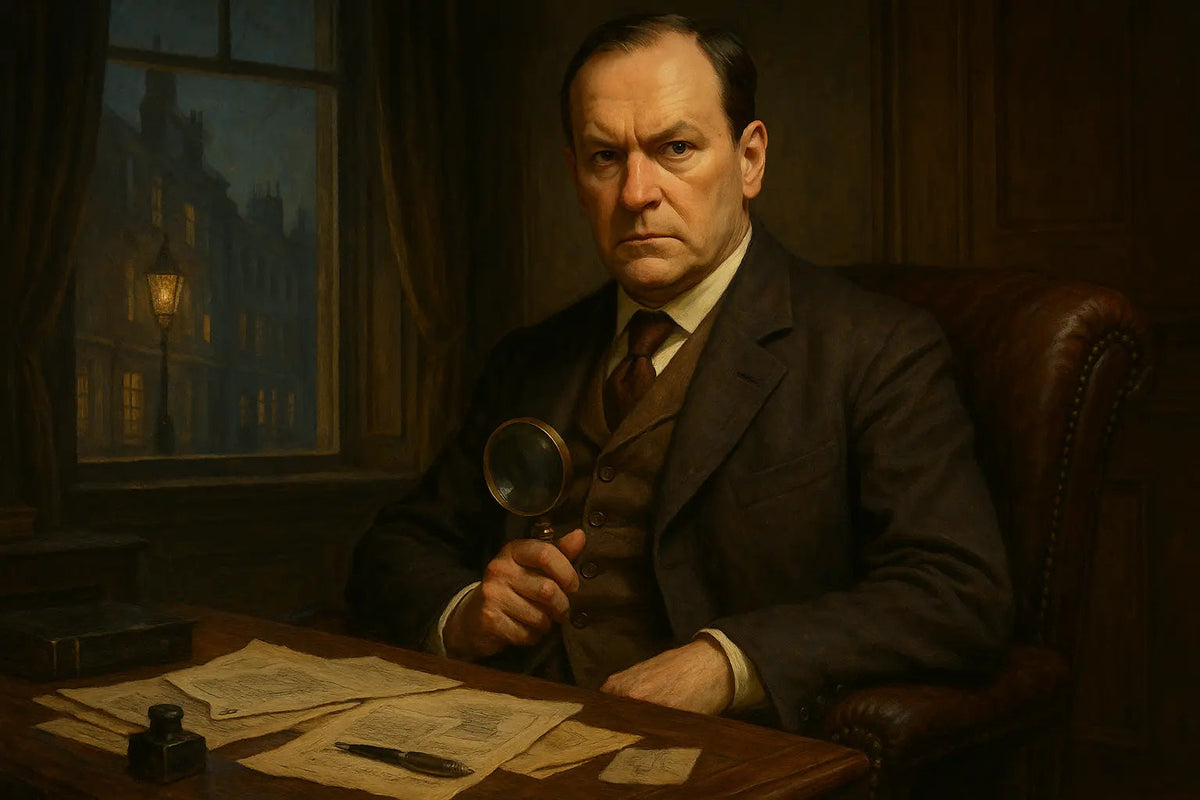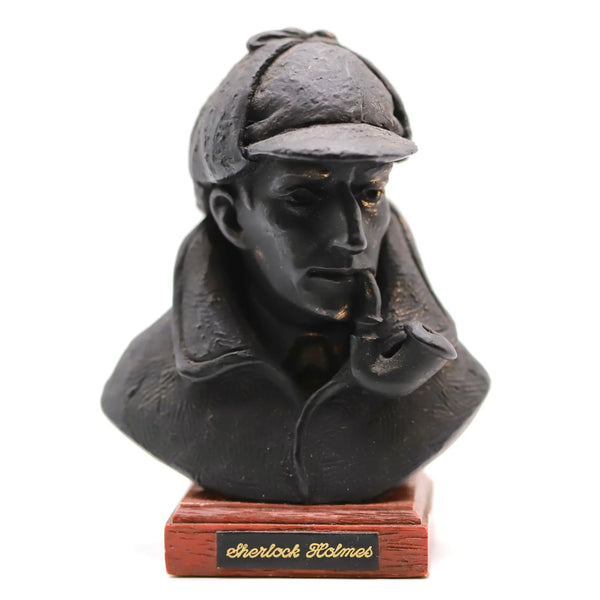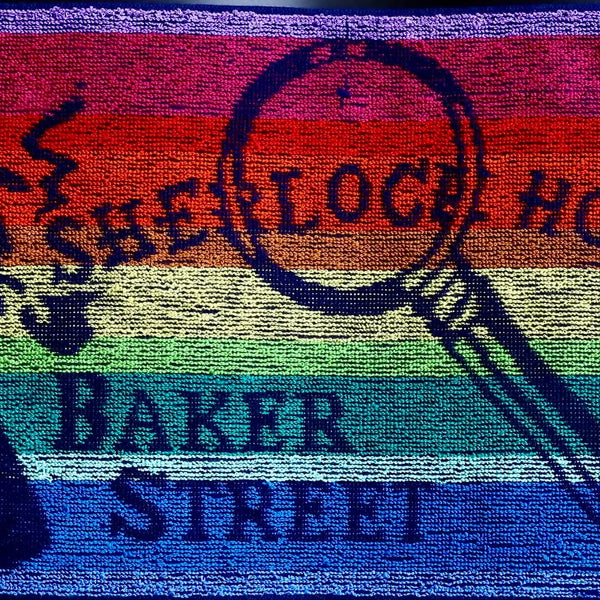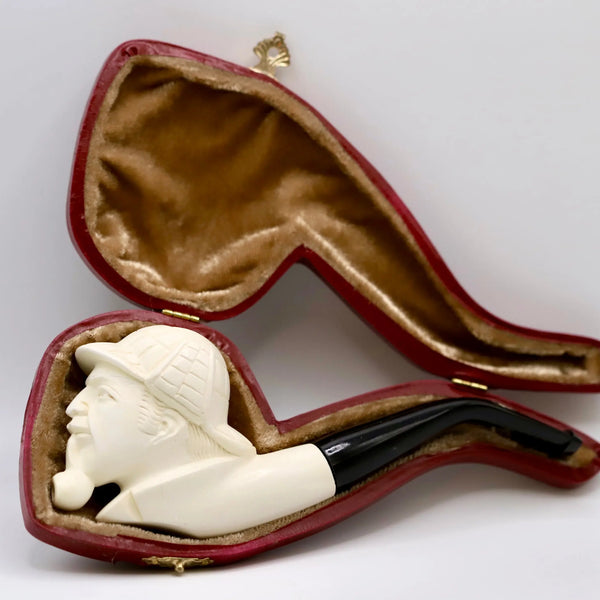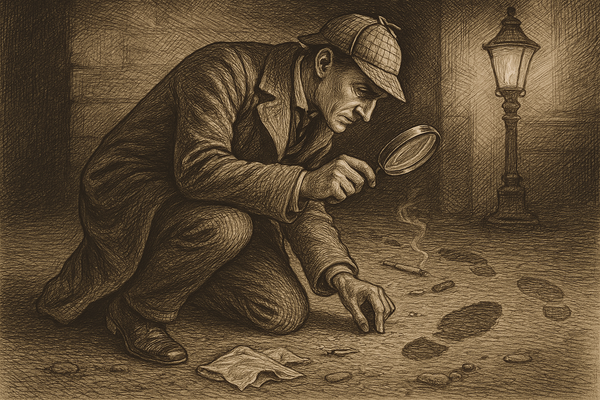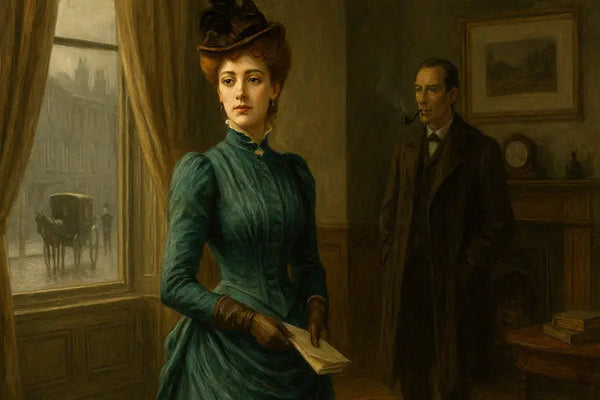Elementary? Hardly. When it comes to the Holmes family, the real genius might surprise you.
Whilst Sherlock Holmes captivated the world with his extraordinary deductive brilliance, operating from the familiar confines of 221B Baker Street, his older and smarter brother Mycroft wielded far greater influence from the shadowy corridors of British government power. Seven years Sherlock's senior and possessing even more formidable intellectual capabilities, Mycroft Holmes represents perhaps the most fascinating unexplored territory in the entire Holmes universe.
For decades, Mycroft remained a minor character in Sir Arthur Conan Doyle's original tales—a sedentary genius who rarely stirred from his famous Diogenes Club chair. However, thanks to the groundbreaking collaboration between NBA superstar Kareem Abdul Jabbar and screenwriter Anna Waterhouse, this untold story has finally emerged from the shadows, revealing the complex origins of Britain's most secretive civil servant.
The Literary Genesis: From Canon Cameo to Contemporary Hero
Arthur Conan Doyle's Original Blueprint
Mycroft's literary debut occurred in "The Greek Interpreter," where Arthur Conan Doyle introduced readers to a character whose intellectual prowess surpassed even the great detective himself. The stouter man who preferred governmental analysis to active investigation represented Doyle's exploration of genius channelled through different pursuits.
In the original Holmes stories, Mycroft emerges as a figure of immense governmental influence, particularly prominent in "The Bruce Partington Plans" where his role in British secret service operations becomes apparent. Doyle cleverly established that whilst Sherlock chose the path of consulting detective, brother Mycroft had selected a career safeguarding beloved Britain's coffers and national security interests.
The famous Diogenes Club, with its strict silence rules and exclusive membership, served as both Mycroft's comfortable existence and a symbol of his preference for observation over action. This gentlemen's club became synonymous with Mycroft's character—a sanctuary where Britain's most brilliant mind could contemplate matters of state without the distractions that animated his younger brother.
The Sibling Dynamic in Canon
Doyle's portrayal of the Holmes brothers established a fascinating sibling rivalry built upon mutual respect and distinctly different life choices. Sherlock comments repeatedly on his older brother's superior intellectual capabilities, acknowledging that Mycroft possesses greater deductive powers whilst lacking the energy for practical application.
This dynamic creates a compelling contrast: the famous detective who applies his art of deduction to individual cases versus the governmental genius who analyses patterns affecting entire nations. Either Mycroft or Sherlock could solve any given mystery, but their chosen spheres of influence reflect fundamentally different approaches to serving society.
The Jabbar-Waterhouse Revolution: Breathing Life into Legend
An Unlikely Literary Partnership
The collaboration between Kareem Abdul Jabbar and Anna Waterhouse represents one of modern literature's most intriguing partnerships. The York Times bestselling author and former basketball legend joined forces with the accomplished screenwriter to explore what young Mycroft Holmes might have experienced before his governmental career commenced.
Their Mycroft Holmes series boldly ventures into unexplored territory, crafting compelling narratives around young Mycroft and his brilliant friend Cyrus Douglas, a man of African descent whose intellectual capabilities match those of the Holmes family. This innovative approach adds much-needed diversity to Victorian narratives whilst respecting the essential character elements established by Conan Doyle.
Character Development and Storytelling Innovation
The series excels in showing how Mycroft Holmes reveals his investigative prowess through cases that test his analytical abilities before governmental responsibilities constrained his activities. Unlike Sherlock's later preference for dramatic confrontations, young Mycroft demonstrates a methodical approach that foreshadows his eventual governmental role.
Abdul Jabbar and Anna craft scenarios where Mycroft persuades Sherlock through logic rather than authority, establishing the intellectual foundation for their adult relationship. These early interactions illuminate how the older and smarter brother influenced young Sherlock's developing detective methodology.
Key Narrative Elements and Mysteries
The authors weave intricate plots involving mysterious disappearances, gruesome murders, and governmental intrigue that challenge young Mycroft and friend Cyrus Douglas. When Georgiana abruptly departs from Mycroft's life, the emotional impact shapes his later reluctance to form deep personal attachments—a characteristic trait in Doyle's original portrayal.
Douglas receives troubling reports about cases that require both intellectual analysis and social navigation, testing the partnership between the future civil servant and his devoted friend. These adventures demonstrate how Mycroft developed his preference for working behind the scenes rather than seeking public recognition like his younger brother.
The series explores dark secrets within British government operations whilst examining the personal cost of keeping secrets from family and friends. Strange footprints, coded messages, and international conspiracies provide the backdrop for character development that explains Mycroft's later governmental expertise.
Governmental Genius: Mycroft's Civil Service Career
The Unofficial Power Behind the Throne
Mycroft's position within British government represents one of literature's most intriguing examples of invisible influence. Doyle deliberately kept his exact role undefined, describing him only as someone who occasionally "is" the British government on matters of supreme importance.
This ambiguity allows for fascinating speculation about Mycroft's true responsibilities. His involvement in "The Bruce Partington Plans" reveals knowledge of state secrets that suggests either very high security clearance or actual participation in British secret service operations. The man Mycroft became represents the ultimate civil servant—someone whose influence shapes national policy whilst remaining largely anonymous.
Intelligence Operations and International Affairs
The governmental work that Mycroft undertakes often involves international implications that dwarf Sherlock's individual cases in scope. Whilst the famous detective solves murders and recoveries stolen jewels, brother Mycroft analyses threats to national security and international stability.
His connection to the Sherlock Holmes effect in governmental contexts demonstrates how deductive reasoning principles apply to intelligence analysis and policy formation. Mycroft's methods influence how modern intelligence services approach pattern recognition and threat assessment.
The Diogenes Club: More Than a Gentleman's Retreat
The famous Diogenes Club serves multiple functions in Mycroft's professional life. Beyond providing Mycroft's comfortable existence away from governmental pressures, the club likely facilitates unofficial meetings between influential figures who prefer discretion over publicity.
The club's strict silence rules create an environment where sensitive discussions can occur without risk of eavesdropping—essential for someone in Mycroft's position. Regular members probably include other governmental figures, military officials, and perhaps even foreign contacts who require neutral meeting grounds.
Psychological Profile: Understanding the Elder Holmes
The Burden of Superior Intelligence
Mycroft's position as the smarter brother in a family of exceptional minds creates unique psychological pressures. Unlike Sherlock, who channels his abilities into active detection work that provides regular validation, Mycroft must find satisfaction in governmental service where recognition remains deliberately limited.
This dynamic explains Mycroft's sedentary lifestyle and preference for theoretical analysis over practical investigation. Only Mycroft fully understands the weight of possessing capabilities that could reshape national policy whilst being constrained by bureaucratic protocols and political considerations.
Relationships and Social Isolation
The strained relationship between the Holmes brothers reflects more than simple sibling rivalry—it represents two brilliant minds choosing vastly different applications for similar gifts. Mycroft's friendship with Cyrus Douglas in the Abdul Jabbar-Waterhouse series provides crucial insight into his capacity for deep personal connections when circumstances permit.
Keeping secrets becomes both professional necessity and personal burden for Mycroft. His governmental position requires discretion that inevitably creates distance from family relationships, explaining why his interactions with Sherlock often carry undertones of unspoken knowledge and carefully guarded information.
Personal Motivations and Ethical Framework
Mycroft's dedication to British government service reflects a moral framework centred on utilitarian principles—achieving the greatest good for the greatest number through informed governmental policy. This contrasts with Sherlock's more individualistic approach to justice, creating philosophical differences that enrich their relationship dynamic.
His connection to beloved Britain's coffers suggests deep patriotic motivation combined with pragmatic understanding of how governmental resources must be protected and allocated. Mycroft's decisions often involve balancing competing national interests whilst maintaining ethical standards appropriate to his position.
Cultural Impact and Modern Adaptations
Screen and Stage Interpretations
Various adaptations have attempted to capture Mycroft's essence, though his largely sedentary nature presents challenges for visual media. Successful portrayals typically emphasise his intellectual authority whilst finding creative ways to demonstrate his influence without requiring physical action sequences.
Starring brothers Mycroft and Sherlock in modern interpretations often requires expanding Mycroft's canonical role to provide sufficient screen time and character development. The ultimate Sherlock Holmes cinema countdown reveals how different productions have handled this challenge across multiple decades.
Literary Influence and Academic Recognition
Mycroft's character has influenced numerous fictional governmental operatives and civil servants in subsequent literature. The archetype of the brilliant bureaucrat who wields power through analysis rather than action appears throughout modern spy fiction and political thrillers.
Academic analysis of Mycroft's role in detective fiction often focuses on his representation of governmental authority and intellectual elitism. The New Annotated Sherlock Holmes editions frequently include extensive commentary on Mycroft's political implications and literary significance.
Contemporary Relevance and Modern Parallels
Mycroft's governmental role resonates strongly with contemporary discussions about intelligence services, surveillance, and civil liberties. His character embodies tensions between security requirements and individual freedoms that remain highly relevant in modern political discourse.
The evolution from minor character to complex protagonist reflects changing literary appetites for governmental thrillers and spy fiction. Mycroft's intellectual approach to national security anticipates modern emphasis on intelligence analysis and data interpretation in international relations.
The Jabbar-Waterhouse Legacy: Expanding Holmes Canon
Innovative Approach to Canonical Expansion
The success of the Mycroft Holmes series demonstrates how contemporary authors can respectfully expand classical literature whilst adding modern perspectives and diverse voices. Kareem Abdul Jabbar and Anna Waterhouse prove that canonical characters can support entirely new narratives without diminishing their original literary value.
Their introduction of Cyrus Douglas as a brilliant character of African descent adds historical authenticity whilst addressing the demographic limitations of Doyle's original Victorian perspective. This approach enriches the Holmes universe without contradicting established canonical elements.
Critical Reception and Literary Merit
The series has received significant critical acclaim for its respectful handling of beloved characters whilst creating compelling original storylines. Literary critics particularly praise the authors' ability to maintain Doyle's narrative voice whilst exploring psychological depths that the original stories only suggested.
Reader response has been overwhelmingly positive, with fans appreciating the opportunity to explore Mycroft's character development without losing the essential elements that made him fascinating in Doyle's original conception. The York Times bestselling author status reflects both commercial success and literary recognition.
Influence on Holmes Literature and Beyond
The Mycroft Holmes series establishes a precedent for expanding secondary canonical characters into protagonists whilst maintaining literary quality and canonical respect. This approach influences other authors working within established fictional universes, demonstrating sustainable methods for continued character development.
The collaboration between Abdul Jabbar and Anna also represents successful cross-disciplinary partnerships in literature, showing how diverse perspectives can enhance classical material whilst appealing to contemporary audiences seeking more inclusive narratives.
Frequently Asked Questions
Who is Mycroft Holmes in relation to Sherlock Holmes?
Mycroft Holmes serves as Sherlock's older brother, years Sherlock's senior, and according to Arthur Conan Doyle's original stories, possesses even greater deductive abilities than the famous detective. Brother Mycroft works for the British government in a high-level capacity, often handling matters of national security that dwarf Sherlock's individual cases in scope and importance.
What is the Mycroft Holmes series by Kareem Abdul-Jabbar?
The Mycroft Holmes series, co-authored by NBA superstar Kareem Abdul Jabbar and screenwriter Anna Waterhouse, explores the untold story of young Mycroft Holmes before his governmental career commenced. The series features Mycroft and his brilliant friend Cyrus Douglas, a remarkable man of African descent, solving intricate mysteries in Victorian London whilst developing the analytical skills that would later serve British secret service operations.
What is the Diogenes Club in Mycroft Holmes stories?
The famous Diogenes Club represents Mycroft's exclusive gentlemen's club where silence is strictly enforced and influential members gather for discrete discussions. It symbolises Mycroft's comfortable existence and serves as his sanctuary from the demanding responsibilities of British government service. The club reflects his preference for observation and analysis over direct action, providing the perfect environment for governmental contemplation.
How does Mycroft compare to Sherlock in intelligence?
Doyle explicitly established Mycroft as the older and smarter brother, with Sherlock himself acknowledging his brother's superior deductive powers throughout the canonical stories. However, Mycroft deliberately lacks Sherlock's energy and motivation for active investigation, preferring governmental analysis and policy formation to fieldwork and dramatic confrontations.
What role does Mycroft play in the British government?
Whilst Doyle never specified Mycroft's exact position, he's portrayed as wielding enormous influence within the British government, often handling matters affecting national security and international relations. His work with British secret service operations and access to state secrets makes him one of the most powerful civil servants in Britain, occasionally becoming "the government" itself on matters of supreme importance.
Are there Mycroft Holmes adaptations beyond the books?
Mycroft appears in various Sherlock Holmes adaptations across film and television, though often in supporting roles that emphasise his governmental connections and intellectual authority. The Mycroft Holmes series by Abdul Jabbar and Waterhouse represents the most comprehensive exploration of his character as a protagonist, finally giving him the literary attention his canonical importance deserves.
How does the Jabbar-Waterhouse series connect to original Holmes canon?
The authors carefully maintain continuity with Conan Doyle's original characterisation whilst exploring young Mycroft's formative experiences before his governmental career. Mycroft and Sherlock's relationship development, Mycroft's intellectual capabilities, and his eventual preference for governmental service all align with canonical elements whilst providing rich backstory that enhances rather than contradicts Doyle's original vision.
Are Mycroft Holmes and Enola Holmes related in the stories?
Yes, Mycroft Holmes would be Enola Holmes' eldest brother in the expanded Holmes family universe. Whilst Nancy Springer's Enola Holmes series and the Jabbar-Waterhouse Mycroft Holmes books operate as separate literary projects, both characters represent successful expansions of Doyle's original Holmes siblings concept. Mycroft serves as the governmental genius, Sherlock as the consulting detective, and Enola as the independent young investigator, each demonstrating different applications of the family's exceptional intellectual inheritance.
The Future of Mycroft Holmes Literature
Ongoing Series Development and Potential Storylines
Future instalments in the Kareem Abdul Jabbar and Anna Waterhouse series promise continued exploration of young Mycroft and Cyrus Douglas's partnership, potentially covering their evolution from university students to the mature figures suggested by canonical references. Mycroft's transition from active investigation to British government service offers rich material for character development.
The authors might explore Mycroft's early governmental appointments, his development of the analytical methods that made him indispensable to British secret service operations, and the personal sacrifices required by his chosen career path. Douglas runs the risk of being separated from Mycroft by governmental demands, creating emotional conflict that could drive compelling narratives.
Broader Literary Implications and Academic Interest
The success model established by the Mycroft Holmes series demonstrates sustainable approaches to expanding classical literature whilst maintaining canonical respect and literary quality. Academic interest in Mycroft as a character study continues growing, with scholars examining his representation of governmental authority, intellectual elitism, and Victorian social dynamics.
Contemporary authors working within established fictional universes increasingly look to the Abdul Jabbar-Waterhouse collaboration as an exemplar of how to balance innovation with tradition. Their approach influences discussions about diversity in classical adaptations whilst proving that inclusive narratives can enhance rather than diminish original material.
Cultural Legacy and Enduring Appeal
Mycroft Holmes' evolution from minor character to complex protagonist reflects changing literary appetites and social awareness whilst demonstrating the enduring appeal of the enigma of Sherlock Holmes universe. His character provides unique opportunities to explore governmental themes, intelligence operations, and civil service whilst maintaining the intellectual rigour that defines the Holmes family legacy.
The Holmes brothers dynamic continues resonating with contemporary audiences who appreciate complex family relationships and the tension between individual achievement and public service. Mycroft's relevance in discussions of modern intelligence services and governmental surveillance ensures his continued literary significance.
Conclusion: The Mastermind Behind the Mastermind
Mycroft Holmes represents one of literature's most compelling examples of hidden genius—a character whose true brilliance only emerges through careful analysis and imaginative expansion. From his origins as a minor character in Doyle's canonical stories to his current status as a fully-realised protagonist in the Abdul Jabbar-Waterhouse series, Mycroft has finally received the literary attention his capabilities deserve.
The brilliant collaboration between Kareem Abdul Jabbar and Anna Waterhouse proves that classical literature can support innovative expansion whilst maintaining essential character integrity. Their Mycroft Holmes series honours Doyle's original vision whilst creating space for diverse voices and contemporary perspectives that enrich the entire Holmes universe.
Mycroft's unique position as the smarter brother who chose governmental service over public recognition provides endless opportunities for literary exploration. His influence on British government policy, his complex relationship with younger brother Sherlock, and his personal sacrifices in service of national interests create a character whose depth continues revealing new facets through careful literary development.
The untold story of Mycroft Holmes reminds us that sometimes the most interesting characters operate in shadows rather than spotlights. Whilst Sherlock captured public imagination through dramatic deductions and famous cases, brother Mycroft shaped the very governmental systems that allowed such justice to flourish. In an age increasingly aware of institutional power and intelligence operations, Mycroft's story becomes not just entertaining literature but essential reading for understanding how brilliant minds serve society through different paths.
From the famous Diogenes Club to the corridors of British government power, Mycroft Holmes continues proving that intellectual excellence takes many forms—and sometimes the greatest genius lies not in solving individual mysteries, but in preventing them from occurring altogether.
